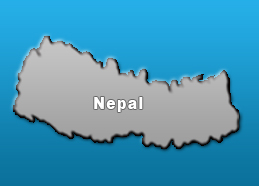Three-day Maoist strike paralyses Nepal
 Kathmandu, Dec 20 - As talks with the government failed, Nepal's former Maoist guerrillas Sunday enforced a three-day general strike nationwide, shutting down transport, industries and educational institutions and cutting off road links with India.
Kathmandu, Dec 20 - As talks with the government failed, Nepal's former Maoist guerrillas Sunday enforced a three-day general strike nationwide, shutting down transport, industries and educational institutions and cutting off road links with India.
Defying the morning chill, hundreds of former rebels began holding protest marches in the capital and major towns outside, blocking highways by burning tyres and shouting slogans against President Ram Baran Yadav, the target of the protests.
Though Maoist chief and former prime minister Pushpa Kamal Dahal Prachanda said the three-day closure would be peaceful, the protesters were reported to have vandalised at least two vehicles by early morning, resulting in police arresting eight attackers.
A taxi in the popular tourist city of Pokhara was vandalised by the former insurgents while a passenger bus, which had run into mechanical trouble last night and was speeding towards its destination in southern Nepal in the morning, was also attacked by the protesters who, however, first made the passengers alight.
In the border town of Dhulikhel, marchers made four oil tankers from India headed for the capital turn back. The three-day blockade will worsen the present fuel crisis in Nepal that depends on oil supplies from India.
Roads remained deserted in the capital and the highways connecting the troubled country with India in the south and China in the north were empty of traffic on the first day of the closure.
Condemning the disruption, the Federation of Nepalese Chambers of Commerce and Industry said they were forced to observe the closure since the government had failed to provide any assurance of safety.
However, the umbrella organisation of Nepal's industrial and business houses warned that it would be compelled to implement a no work-no pay measure for employees for the three days.
Nepal's Prime Minister Madhav Kumar Nepal will run into the protests as he arrives in Kathmandu in the afternoon from Copenhagen where he had been participating in the UN conference on climate change.
Nepal is scheduled to visit China from Dec 26 though the Maoists have warned they would call an indefinite strike if the present protests failed to meet their demands.
The former rebels, who are now the largest party in parliament after winning last year's election, are asking the government to rescind the decision taken by the president in May to reinstate the chief of the army, Gen Rookmangud Katawal, whom the then Maoist-led government had sacked for insubordination.
"The midnight reinstatement was a coup that heralds military rule in Nepal in future," Maoist deputy chief and coordinator of the protests, Baburam Bhattarai, said Sunday.
The former rebels, who fought a 10-year war to overthrow monarchy and turn Nepal into a federal republic, are accusing the ruling parties of trying to scuttle the agreement and abet the comeback of deposed king Gyanendra.
They are also prophesying that the government would fail to implement a new constitution, to be written with people's direct participation, by May 2010 and would instead seek to declare emergency and President's Rule backed by the army.
The government, on the other hand, says it is committed to unveiling the new constitution next year and is counter-accusing the former rebels of violating the peace pact by enforcing general strikes and other protests. (IANS)